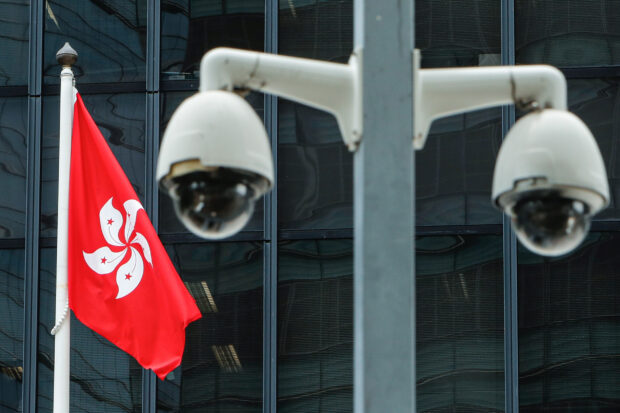Hong Kong legislature passes tough new national security law

A Hong Kong flag is flown behind a pair of surveillance cameras outside the Central Government Offices in Hong Kong, China July 20, 2020. REUTERS/Tyrone Siu
Hong Kong, China — Hong Kong legislators unanimously passed a new national security law on Tuesday that introduces penalties such as life imprisonment for crimes related to treason and insurrection, and up to 20 years in jail for the theft of state secrets.
The law, which the United States, Britain and the European Union have warned could further curtail freedoms in Hong Kong, was fast-tracked through the legislative process.
READ: Hong Kong issues new national security law bill with tougher jail terms
UN rights chief Volker Turk denounced the “rushed” adoption, criticising it as “a regressive step for the protection of human rights”.
But city leader John Lee called it “a historic moment for Hong Kong”, adding that the law would come into effect Saturday.
Article continues after this advertisementThe government’s previous attempt to introduce Article 23 — as it is commonly referred to — was in 2003, but it was dropped after half a million Hong Kongers took to the streets in protest.
Article continues after this advertisementLee had repeatedly cited Hong Kong’s “constitutional responsibility” to create the new law as required by the Basic Law, the city’s mini-constitution since its handover from Britain to China in 1997.
The homegrown legislation will work in tandem with the national security law imposed by Beijing in 2020 after huge and at times violent pro-democracy protests.
READ: Explainer: Why Hong Kong wants new national security laws
The new law punishes dozens of offences under five categories: treason, insurrection, theft of state secrets and espionage, sabotage endangering national security, and external interference.
Lee had said it was needed to plug the legislative gaps left by Beijing’s version, which targets secession, subversion, terrorism and collusion with foreign forces.
The law “will allow Hong Kong to effectively prevent, suppress and punish espionage activities, conspiracies and traps from foreign intelligence agencies, and infiltration and sabotage carried out by hostile forces”, he said Tuesday.
He added that it would also “effectively prevent black-clad violence”, a reference to the 2019 pro-democracy protests that were quashed.
One of the last-minute amendments added to the law last week empowers Lee and his cabinet to create new offences — to account for “unforeseen circumstances” — punishable by up to seven years in prison.
‘An effective lock’
Sanctioned by the United States for his oversight of the crackdown on the protests while security chief, Lee has called the law “an effective lock to prevent burglars” as authorities seek to combat “threats posed by external forces”.
Penalties run up to life in prison for sabotage endangering national security, treason and insurrection, 20 years for espionage and sabotage, and 14 years for external interference.
It has also expanded the British colonial-era offence of sedition to include inciting hatred against China’s Communist Party leadership, with an aggravated sentence of up to 10 years in jail.
As with its 2020 predecessor, the new law claims jurisdiction over some offences committed outside Hong Kong.
But the Beijing-run national security office in Hong Kong said “only an extremely small number of people” would be punished under Article 23, mirroring language used in the run-up to the original security law’s imposition.
Nearly 300 people have so far been arrested under that law, while dozens of politicians, activists and other public figures have been jailed or forced into exile.
Calling it “a new Great Wall of rule of law”, the security office said in a statement that “the majority of Hong Kong residents and international investors will benefit” from it.
‘A regressive step’
As part of the 1997 handover from Britain, Hong Kong was guaranteed certain freedoms — as well as judicial and legislative autonomy — for 50 years in a deal known as “one country, two systems”.
The accord has helped cement the city’s status as a world-class business hub, bolstered by a reliable judiciary and political freedoms distinct from the mainland.
Britain’s foreign minister David Cameron said the new law would “further damage the rights and freedoms enjoyed” in Hong Kong and have “far-reaching implications” for the rule of law and independence of institutions.
State Department spokesman Vedant Patel meanwhile told reporters Tuesday that the United States was “alarmed by the sweeping and what we interpret as vaguely defined provisions” in the law.
And the Amnesty International rights group called the law “draconian”.
“The passing of this law sends the clearest message yet that the Hong Kong authorities’ hunger to accommodate Beijing’s will outstrips any past commitments on human rights,” said Amnesty’s China specialist Sarah Brooks.